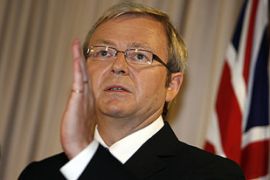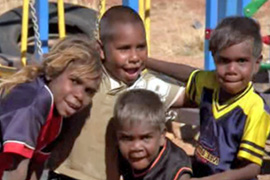Rudd promises apology to Aborigines
New Australian PM says apology will help build bridge between communities.

Rudd’s predecessor, John Howard, who was prime minister for 11 years, had repeatedly refused calls for the federal government to apologise saying the country should not have a “black armband” view of history.
A key issue of contention has been over what has become known as the “stolen generation” of Aboriginal children who were forcibly removed from their homes and fostered to white families.
Stolen generation
 |
| Aborigines face a lift expectancy up to 17 years lower than the rest of Australia |
Howard had said the policy of removing children, carried out between the 1870s and 1960s was done by past governments and an apology could open the door to expensive compensation claims.
However every Australian state government has issued an apology and no compensation claims have yet been lodged.
Rudd said offering an apology would be more than symbolic was intended to “build a bridge”.
“Then you can use that bridge to start doing some practical things like closing the gap in life expectancy between aboriginal and non-aboriginal Australia,” he said.
“I’m not just into symbols for symbols’ sake.”
‘Say sorry’
Responding to Rudd’s pledge Lowitja O’Donoghue, an Aboriginal elder and herself a member of the stolen generation urged the new prime minister not to be evasive.
“Don’t use apology. We want sorry, OK, that’s what we’re saying. We want him to say sorry,” she told local radio.
Aborigines are Australia‘s most disadvantaged group, having a life expectancy 17 years below the rest of the Australia and with many living in third world conditions.
In May this year a report for the World Health Organisation found that standards of healthcare for Aborigines was more than 100 years behind the rest of Australia.
The report found that in some parts of the country the life expectancy for Aborigine males was just 33 years – the same for men born in Rwanda or Ethiopia.
At the same time it said Aborigines faced diseases unheard of in much of the developed world, such as leprosy, tuberculosis and rheumatic heart disease, the report said.